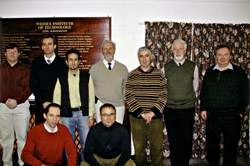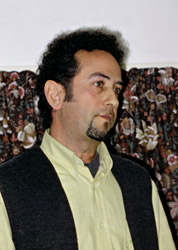Delegation From Castila-La Mancha University
A delegation from Castilla-La Mancha University recently visited the Wessex Institute of Technology to sign a framework agreement between the two institutions and plan future collaboration.

They were welcomed by Professor Carlos A. Brebbia, Director of WIT, who explained the strategic aims of the Institute and the way in which its activities are organised. They include training and research at PhD and Master level, research on a variety of topics, publishing, support to industry and a range of short courses and conferences oriented towards new areas of scientific endeavours.
WIT, Carlos explained, sees itself as a Centre for Knowledge Transfer. While primarily a scientific institution dedicated to advanced computational engineering work, it also aims to bridge the gap between physical sciences and humanities. This takes place through a series of initiatives such as publishing, meetings and networks.
The research at the Institute is carried out through a number of divisions, ie:
* Environmental Fluid Mechanics which is currently working on problems such as water resources, food supply contamination, pharmaceutical contamination, product life cycle, landfills and other waste management systems.
* Information and Communications Engineering It works on problems related to mobile and wireless communication systems, electromagnetic compatibility, electrical corrosion, combustion problems and more recently the modelling of forest fires and biomedical applications. As a consequence of the size of the problems involved, the division is also developing methods for high performance computing.
* Damage Mechanics It works on advanced techniques for stress analysis, including fracture mechanics, composite materials, stress trajectories, multiple cracks interaction and other theoretical problems of fundamental importance for the accuracy of computer models. It also carried out work on teatonic stress fields, a topic of current relevance following major earthquakes and tsunamis.
* Industrial Research This covers a wide variety of research development and include industrial support with particular reference to boundary element programmes for cathodic protection studies and fracture and crack propagation as well as other applications in mechanical sciences. They have developed the most advanced programmes in the world in BEM. The division is sponsored by industry and research organisations throughout the world, particularly in the USA, in addition to Europe. More recently, it has expanded its support to countries in the Far East, particularly China.
* Ecological Modelling This is a new Division which aims at the analysis and understanding of ecological systems. It works in close contact with major research groups around the world, in particular with those related to the late Professor I. Prigogine.
The Publications Division of WIT is a separate company which has produced a large number of books, approximately half of them resulting from conferences and the others consisting of advanced monographs. Most publications are produced in paper and electronic form. The emphasis has evolved from purely physical sciences to include a series of transdisciplinary publishing. An important recent initiative of WIT Press has been the launching of three new journals, each of them oriented towards reaching a particular community. They are:
* Ecodynamics Journal This publication is guided by the work of I. Prigogine, its late Honorary Editor. It covers all aspects of ecological modelling ranging from physical sciences to economics and epistemology. It aims to increase the understanding of the relationship between arts and sciences.
* Sustainable Development and Planning Journal It is a forum for scientists and practitioners specialising in a wide range of social and technical topics related to sustainable development.
* Design and Nature Journal This is a channel of communication for researchers working on a variety of studies involving nature and its significance to modern scientific thought and design.
WIT attempts to reach out to an ever-expanding community through its publications.
The Conference and Course programmes are other ways in which WIT contributes to knowledge transfer. These activities involve organising nearly 30 conferences and approximately the same number of courses each year. The Conference programme has been particularly successful since the Institute started and it is well known throughout the world. Most conferences held outside the UK are organised in conjunction with an institution or university, while those in the UK now take place on the New Forest Campus, following the expansion and improvement of the lecture room buildings.
WIT has a series of joint training activities with other institutions, involving Master and PhD programmes. They have been very successful with a substantial number of graduates now in positions of responsibility in industry and academia.
The Institute has launched several medals and awards which are not only a way to recognise the work of outstanding colleagues around the world, but also set up the basis for further communication and collaboration.
The well established Wessex Institute medal is awarded two or three times a year to outstanding scientists involved in computational methods and their applications.
The more recently launched Prigogine Medal honours the memory of the well known Nobel Prize Winner and is awarded annually to the best scientists in the world in the field of ecological modelling. It has been awarded three times so far, ie to Prof Sven Jorgensen of Denmark, in Siena in 2004; Prof Enzo Tiezzi, in Cádiz in 2005; and Prof Bernard Patten of USA, in Tallinn in 2006. The reputation of the recipients ensures the continuous prestige of the Medal.
The latest initiative of WIT has been as a result of the recently held Conference on Ecology and Environmental Resources, organised by WIT in Bariloche, Argentina, in collaboration with the Universities of Rome and Siena in Italy. The meeting, aimed at reaching out to social and political scientists and practitioners, demonstrates the commitment of the scientific community towards solving the problems facing the Planet. The Conference was opened by Dr Adolfo Perez-Esquivel, Nobel Peace Prize Winner and defender of human rights and the environment. The success of the meeting led to the launching of the so-called Patagonia Declaration, the highlights of which are as follows:
* The conference believes that scientific knowledge has to be linked to social and political realities and that it is necessary to promote knowledge at all levels.
* The conference wishes to ensure that the voice of the scientific community is heard by politicians, social scientists and society in general.
* The conference wants to develop mechanisms to communicate with all sectors of society, particularly those that are usually in need of scientific and technical support.
In the pursuit of these objectives, the Conference decided to create a Scientific Group which can provide advice to relevant organisations (the new Group, called SCIENCE ADVICE is being organised by Carlos Brebbia. For more information, contact
The University of Castilla-La Mancha (UCLM) is comparatively new. It is located in the central part of Spain and anxious to establish links with other institutions in Europe as well as the rest of the world. Prof Jorge de las Heras, Director of International Relations, described the region and its different industries, including some major aerospace companies. UCLM has four campuses, including one in Toledo as well as a large one in Albacete.

Jorge described in more detail the work carried out at the Ecology Research Centre which is divided into two fields, Forestry and Water. The Forestry research deals with fire, restoration and rural development. The Water section works on water quality, wastewater and limnology.
Fires are an important ecological problem in the region and UCLM has developed a technology that has also been exported to other countries, particularly those in Latinamerica. The research deals with the effect of fire on ecosystems and how to induce post-fire regeneration.
Rural development has received a lot of attention recently and involves ways to improve the life quality of forests and forest dwellers. This can be done by promoting eco-tourism and the growth of organic food.
Of special importance in the region of Castilla-La Mancha are water resources. UCLM has been studying effects of nitrates, problems related to river ecology, and re-use of treated wastewater. The region has serious water shortage problems and this drives a substantial amount of the current research.
Prof Enrique Arias described the work at the Computer Science Institute where the main areas of research are on Concurrent and Distributed Systems, including grid and numerical computing. One of the applications of this research has been in the analysis of the pantograph system on behalf of the Spanish Railway Company.
Jorge de las Heras also presented some results of preliminary discussions held in Spain on the topic of woodland management and this application is mitigating the effects of global change. The first step is to analyse the effect of global change on the woodlands in order to adopt some possible strategies. Changes in atmospheric composition and climate changes can result in fires, land use changes, introduction of new species and disappearance of others. Woodlands provide carbon reserves and flow, water resources and biodiversity.
Several important meetings took place during the visit of the UCLM delegation, dealing with areas of collaboration in training, research, publishing and major scientific conferences.
Two senior researchers from UCLM are expected to arrive at the Lodge shortly to work in the Environmental Fluid Mechanics and Information & Communications Divisions. Further exchange will take place in the future.
Another important initiative is the joint organisation of the 11th International Conference on Computational Methods in Railways (COMPRAIL) which will take place from 15 to 17 September, 2008, in the most beautiful city of Toledo. The University of Castilla-La Mancha is located in a building complex that originally consisted of a series of monasteries, council rooms and a large Church. Toledo is not only an important city as the old capital of Spain, but it was its most prominent cultural centre for a long time. Some of these traditions are now taken over by the comparatively new University of Castilla-La Mancha, whose roots however are engrained in the unique cultural environment of Toledo.

 Wessex Institute
Wessex Institute